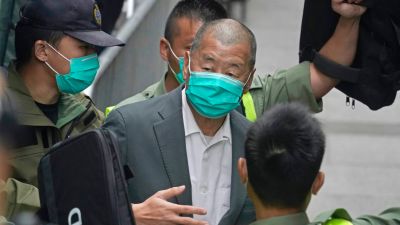Hong Kong billionaire Jimmy Lai jailed for 12 months for taking part in pro-democracy protest

Hong Kong billionaire and opposition newspaper owner Jimmy Lai has been sentenced to 12 months in prison for his role in an unauthorised pro-democracy protest.
Lai was sentenced to 15-months, reduced by three months in mitigation, for his role in the demonstrations in the Chinese-ruled financial hub.
A total of nine anti-government protesters were given jail terms, but four of them, including 82-year-old lawyer and former lawmaker Martin Lee, had their sentences suspended after their age and accomplishments were taken into consideration.
They were found guily of organising and taking part in pro-democracy demonstrations in August 2019, where more than 1.7 million people marched against a bill which would allow suspects to be extradited to mainland China.
The government had argued the proposed amendments would "plug the loopholes" so that the city would not be a safe haven for criminals.
But critics said those in the former British colony would be exposed to China's deeply flawed justice system, and it would lead to further erosion of the city's judicial independence.
Their convictions are another blow to the city's democracy movement, which is facing heavy pressure from Beijing and Hong Kong authorities.
The court suspended the 11-month prison sentence of Lee, an 82-year-old lawyer and former lawmaker known for his advocacy for human rights and democracy, for two years because of his age.
Lai, the founder of Hong Kong’s Apple Daily tabloid, was sentenced to 12 months in prison. He was already held on other charges, including collusion with foreign forces to intervene in the city’s affairs - a new crime under a sweeping national security law that Beijing imposed on the city in 2020.
Lee Cheuk-yan, a pro-democracy activist and former lawmaker who helped organize annual candlelight vigils in Hong Kong on the anniversary of the bloody crackdown on pro-democracy protests in Beijing’s Tiananmen Square in 1989, was sentenced to 12 months in prison.
Lawyers Albert Ho and Margaret Ng both had their 12-month jail sentences suspended for two years. Former lawmaker Leung Kwok-hung was sentenced to 18 months, while another former legislator, Cyd Ho, was given a jail sentence of eight months.
Two other former lawmakers, Au Nok-hin and Leung Yiu-chung, who previously pleaded guilty, were also given jail sentences. Au got 10 months while Leung’s eight-month jail term was suspended for one year.
“I’m ready to face the penalty and sentencing and I’m proud that I can walk with the people of Hong Kong for this democracy,” Lee Cheuk-yan said ahead of the court session, as supporters held up signs condemning political persecution. “We will walk together even in darkness, we will walk with hope in our hearts.”
Hong Kong had enjoyed a vibrant political culture and freedoms not seen elsewhere in China during the decades it was a British colony.
Beijing had pledged to allow the city to retain civil liberties for 50 years after it reverted to Chinese rule in 1997, but recently has ushered in a series of measures, including the national security legislation and electoral reforms that many fear are a step closer to making Hong Kong no different from mainland cities.
Under the new rules, Hong Kong residents can be held liable for any speech or action deemed secessionist, subversive, terrorist or perceived as colluding with hostile foreign political groups or individuals.
Electoral changes mean just 20 out of 90 Legislative Council members will be directly elected and Beijing will retain even tighter control over the body that picks Hong Kong’s future chief executives.
Hong Kong's last British governor, Chris Patten, said that the Chinese Communist Party's “comprehensive assault” on freedoms of Hong Kong and its rule of law remains relentless.
“This week, we have witnessed some of the most distinguished of the city’s peaceful and moderate champions of liberty and democracy placed in Beijing’s vengeful sights,” he said in a statement.
“The CCP simply does not understand that you cannot bludgeon and incarcerate people into loving a totalitarian and corrupt regime."
Hong Kong families moving to UK to benefit from £43m support package
Have Chinese lawmakers taken another step to silence all opposition in Hong Kong?